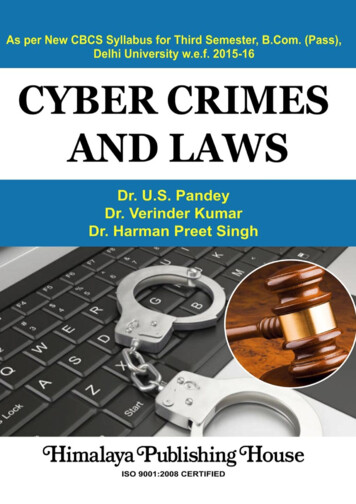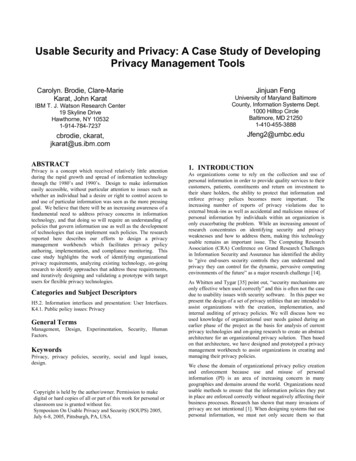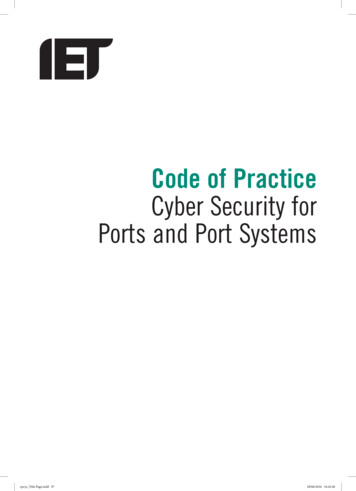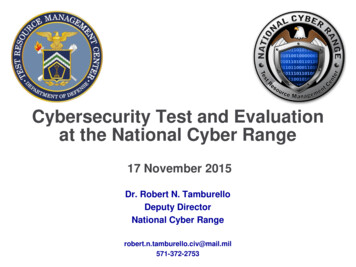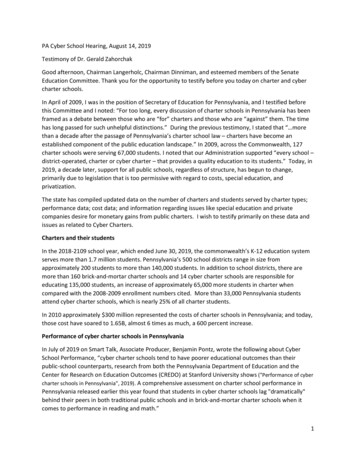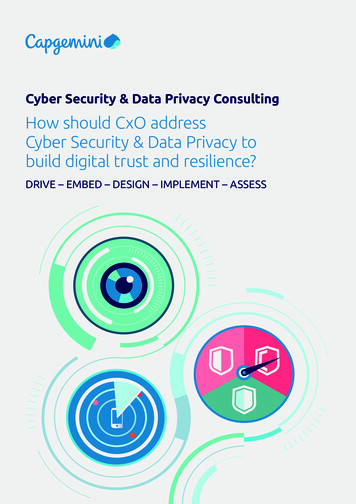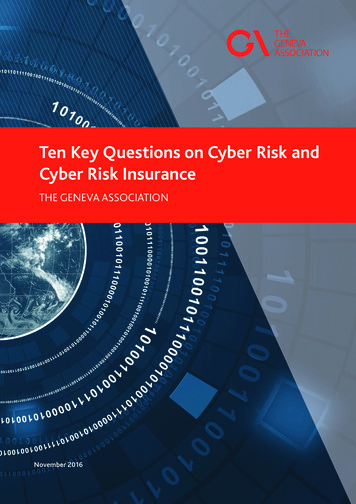
Transcription
The Evolving Privacy and CyberPolicy LandscapeAssociation of Corporate Counsel – Santa Clara, June 6, 2019Hyongsoon Kim, Partner Akin Gump Strauss Hauer & Feld LLPNatasha Kohne, Partner Akin Gump Strauss Hauer & Feld LLPMichael Stortz, Partner Akin Gump Strauss Hauer & Feld LLP 2019 Akin Gump Strauss Hauer & Feld LLP
Overview of Federal and StatePolicy LandscapeA Situation in Flux 2019 Akin Gump Strauss Hauer & Feld LLP2
Current Federal RegulationsAlphabet soup of federal regulatorsRegulations are typically industry or topic specificHealth SectorHIPAA, HITECHFinancial Servs.GLBAGov. ContractsDFARsSpecialized regulations have given rise to specialized litigationVPPA 2019 Akin Gump Strauss Hauer & Feld LLPTCPAFCRACOPPA3
Legislative Developments Pushing New Stateand Federal Privacy Proposals2nd LargestEconomy5th LargestEconomyThe 2018 CaliforniaConsumer Privacy Act 2019 Akin Gump Strauss Hauer & Feld LLPThe EU General DataProtection Regulation4
Other States Have Followed California’s LeadStates have followed California, with 17 states introducing CCPA-similar privacy bills in 2019: 2019 Akin Gump Strauss Hauer & Feld LLP5
Key Facts About Introduced State LegislationOf the 10 pieces of active pending legislation similar to the CCPA:4 of 10ConsumerPrivate Right ofAction2 of 103 of 104 of 10Exemption forinformationcovered by GLBAExemptions ofinformationcovered byHIPAAInferences indefinition ofpersonalinformationAdditionally, New York has a separate, pending Private Right of Action bill that wouldestablish a PRA in the event a breach of consumer’s identifying information 2019 Akin Gump Strauss Hauer & Feld LLP6
State Law Regulation - Overview In 2018, at least 35 states introduced more than 265 bills or resolutions related tocybersecurity Wide variety of regulations, including:BiometricsDatabrokers 2019 Akin Gump Strauss Hauer & Feld LLPData breachnotificationInternet ofthingsInsurance7
Other Key State LawsCalifornia’s IoT law requires connected devices to have“reasonable security” (e.g., unique passwords, newauthentication before first time access, etc.).Maine has a law that is currently before the Governorthat would bar internet providers from using or sellingconsumer browsing history and other data withoutfirst getting consent.Ohio’s law provides a safe harbor for data breachclaims for companies that adopt administrative,technical, and physical safeguards to protect againstbreach.Vermont’s data broker regulation requiringregistration, reporting, and security controls tookeffect on January 1, 2019. 2019 Akin Gump Strauss Hauer & Feld LLP8
What About a Federal Fix? Possibility of federal legislation passing increased, not because of shiftin control in Congress, but due to CCPA’s 2020 effective date 39 proposed or pending federal bills– 20 privacy– 11 data security / breach notification– 8 other remedial measures related to privacy / security Senate Commerce privacy working group leading charge; promiseddraft legislation earlier this year, now suggesting before August recess Big push for legislation to preempt CCPA; CA representatives oppose 2019 Akin Gump Strauss Hauer & Feld LLP9
Triggers for Federal Action on gsEquifaxBreachElectionHacking 2019 Akin Gump Strauss Hauer & Feld LLPPressurefromBusinesses10
Common Threads of Federal Proposals Preemption Disclosures regarding data collection, usage, and dissemination Data subject rights Breach notification Clear privacy policies Duty of care Unlikely to be prescriptive on cybersecurityRegardless of proposals, there is likely to be increased enforcement by allagencies (e.g., FTC inquiry into mobile carriers, SEC inquiry into BEC)The FTC Commissioner has specifically asked for civil penalty authority andsome Administrative Procedures Act rulemaking authority 2019 Akin Gump Strauss Hauer & Feld LLP11
Regulation Proposals are Raising Risk and LiabilitySen. Warren has called on Congress to pass legislation that would include jail time forcorporate executives found liable for a data breach or other privacy violations. Sen.Wyden has also proposed legislation that would impose criminal charges for privacyviolations.Sen. Klobuchar has said: “If they’re making money off of you, you should make money offof them. So if they start sharing your data in a big way, we should start taxing them forthat and that money should go back to consumers.”Sen. Warner supports, among other things, adoption of an “information fiduciary”system whereby service providers assume special duties to respect and protectinformation they obtain.Sen. Kennedy and others have proposed legislation that would transfer back toconsumers the ownership rights for any content they created and posted to social mediasites. 2019 Akin Gump Strauss Hauer & Feld LLP12
Possibility of A Federal Private Right of Action?Split Parties - Dem. Members of Congress pushing for a PRA; Republicans oppose. Sen. Thune (R-SD): “The Democrats have a real interest in . . . a private right of action.Republicans have differing views.”Senate Sen. Blumenthal (D-CT): “I think a private right of action generally upholds individualrights. We ought to be seriously considering it.” Sen. Moran (R-KS) questioned witnesses about concerns associated with PRA in March. Sen. Coons (D-DE) inquired about benefits of the CCPA’s PRA during a hearing.House Rep. Walden (R-OR) raised concerns about a private right of action, stating, “I don’twant to end up creating a platform that looks a lot like patent trolls.” Rep. Carter (R-GA): “And certainly, we don’t need plaintiffs’ attorneys to beinvolved in this, we need the FTC to be the cop on the beat as you described them.”California’s Influence California Attorney General Becerra, an advocate for a private right of action on the statelevel, has met with Sen. Cantwell (D-WA) to discuss components of federal legislation. 2019 Akin Gump Strauss Hauer & Feld LLP13
Significant Uncertainty Remains Congressional approaches vary House vs. Senate Committee hearingsCompetingAdvocacyPerspectives Looming 2020 race Motivated advocacy pushing agenda Industry advocates vs. consumeractivists State regulators pushing their ownroleUnpredictableExecutiveDividedCongress Federal preemption key issue Position of Executive Branch is unclear 2019 Akin Gump Strauss Hauer & Feld LLP14
Tactics to Combat Privacy andCyber ClaimsWhat Every Company Should Consider Before Being Served 2019 Akin Gump Strauss Hauer & Feld LLP15
Information GovernanceInformationSecurityRecords andInformationManagement 2019 Akin Gump Strauss Hauer & Feld LLPData Privacy*The Sedona Conference Commentary onInformation Governance, Second Edition (2019)16
Information Governance – Risk Mitigation Understand what you have, where itcomes from, where it is stored, andwho has access.Data Mapping& AuditingMinimization &RetentionVendor Risk &AccessEncryption/RedactionAnonymizationPolicies &ProceduresEmployeeTraining &TestingBoardOversight Collect and keep only what you need. Encrypt your data at rest and in transit. Ensure Board and managementoversight. Train your employees. Understand your vendor risk andrequire more security from vendors. Implement practical policies. Anonymize and deidentify information. 2019 Akin Gump Strauss Hauer & Feld LLP17
What Regulators Consider Reasonable SecurityPractices – FTC Perspective as OverviewThrough multiple FTC cases, we have a general sense of what the FTC considers“reasonable security” – or the minimum requirements a company must meet.These points are often reflected in guidance from other regulators.AdministrativeMeasures:Technical Measures: Information securityprogram Incident response plan Training Storing data (disposingunnecessaryinformation) No unauthorizedapplications Responding to securitywarnings Monitoring and loggingof activity Must use at leastsimple, low-costdefenses Credentials Secure access Encryption Cybersecurity software Monitoring Data disposal(electronic) Data loss prevention(electronic) 2019 Akin Gump Strauss Hauer & Feld LLPPhysical Measures: Data disposal(physical) Physical security overdata rooms and hardcopy data Data loss prevention(physical) Backup data access Disaster recovery18
The CCPA and Other Laws RequireReasonable Security The CCPA mandates that businesses and service providers implement“reasonable security” controls, sufficient to comply with both the CCPA andthe CA Data Breach Notification Law Consumers are permitted to bring a private right of action based, in part, on abusiness’s failure to implement reasonable security No CA law defines “reasonable security” In 2016, the CA Attorney General’s Office suggested that a company thatcomplied with the 20 minimum security controls defined by the Center forInternet Security ‘s Critical Security Controls (“CIS Controls”) would meet thisrequirement It also suggested the failure to establish and document compliance with theCIS Controls would constitute a lack of reasonable security 2019 Akin Gump Strauss Hauer & Feld LLP19
Insight from Cases Examining ReasonableSecurity in California Plaintiffs have made it past thepleading stage where they allegeddefendants failed to employreasonable security by: Failing to adopt industry-standardencryption, including on POS devices; Failing to train employees; Failing to sufficiently heed governmentwarnings specific to industry; Failing to promptly inform individuals ofbreaches although aware of breach; Failing to adopt reasonable disasterplan and hampering recovery; Failing to implement patches andaddress known cyber risks. 2019 Akin Gump Strauss Hauer & Feld LLPKey sImplementDisaster PlansHeed SecurityWarningsAdopt DataGovernanceBest PracticesTimely DiscloseIncidents/Breaches20
Attorney-Client Privilege and Work ProductProtection – Overview in the Cyber ContextA/C Privilege – Communication(client and counsel) in which legaladvice is sought or provided.Work Product Protection –Materials prepared in anticipationof litigation. Steps should be taken as soon as an incident is suspected to try and ensure anyinvestigation and related materials are protected. Involve counsel immediately; incorporate outside counsel into your IRP. Have counsel retain any forensic consultants or other resources used in investigation. Ensure contracts with forensic team are clear about counsel leading engagement. Have forensic team provide reports directly to outside lawyers. Limit circulation of breach investigation materials to core group, keep high-level. Anticipate that remediation materials and reports to Board may not be protected. Limit disclosures related to investigation to facts alone. 2019 Akin Gump Strauss Hauer & Feld LLP21
Attorney-Client Privilege and Work ProductProtection – Risk AssessmentsWork Product ProtectionInvolve counsel in allcommunicationsLimitdistribution 2019 Akin Gump Strauss Hauer & Feld LLPResultsprovided ediation22
The Best Laid Plans . . .Litigation is becoming increasingly common in the privacy context.Defensible policies and practices are not enough, in-house legal should alsohave a sense of key litigation strategy issues before the company is sued. 2019 Akin Gump Strauss Hauer & Feld LLP23
Data Privacy Landscape – The Alphabet SoupKey Privacy Statutes Relating to LitigationTelephone Consumer Protection Act (TCPA)Fair Credit Reporting Act (FCRA)FederalFederalBiometric Information Privacy Act (BIPA)Children’s Online Privacy ProtectionAct (COPPA)Illinois and counterparts (Washington; Texas – gov enforcement only)Federal, with many states having similar lawsInvasion of Privacy Act (CIPA)CaliforniaVideo Privacy Protection Act (VPPA)FederalWiretap ActFederalSong-Beverly Credit Card ActCalifornia and counterparts (Massachusetts)Shine the Light Law (STLL)California 2019 Akin Gump Strauss Hauer & Feld LLPCalifornia Consumer Privacy Act (CCPA)California (Goes into effect Jan. 1, 2020)24
Data Breach Risks – Industries AffectedHackers target many different industries 2019 Akin Gump Strauss Hauer & Feld LLPSource: https://www.ibm.com/security/data-breach25
Data Breach Risks – Industries Affected In the first half of 2019, there have been well over 100 data breachesmade public The FBI estimates that only 10-12% of cybercrimes are actually reported Analysts estimate that less than half of companies globally aresufficiently prepared for a cybersecurity attack Popular and emerging recenttargets for hackers include: Cloud-hosted entities Health/medical centers e-Commerce retail Crypto currency-based entities 2019 Akin Gump Strauss Hauer & Feld LLP26
Data Breach Risks – Information Types Exposed Hackers target sensitive data, including: Full payment card details Phone numbers User names Encrypted passwords Social security numbers Password hints Bank account numbers IP addresses Email addresses Personal health information 2019 Akin Gump Strauss Hauer & Feld LLP27
Data Breach Risks – Lawsuits Usually FollowAnnouncement of a Breach Individual damages may be small, but when claims are aggregated as aclass action, overall liability can be significant Example: late last year, Marriot announced breach affecting 500 millioncustomers Multiple class action complaints filed within hours One plaintiff sought 25 per person, totaling a demand of 12.5 billion Companies that have recently settled data breach class actions include: 2019 Akin Gump Strauss Hauer & Feld LLP28
Standing – Recent Developments On March 20, 2019, in Frank v. Gaos, the Supreme Court vacated a NinthCircuit privacy settlement in view of its 2016 Spokeo decision The Court reiterated that a plaintiff does not “automatically” have standingby claiming a violation of a statutory right that authorizes private action The post-Spokeo dust has not yet settled: “Third Circuit: FACTA Class Plaintiff Lacked Concrete Injury Required forStanding Under Spokeo” “Second Circuit Joins Consensus Holding TCPA Plaintiffs Have StandingUnder Spokeo” “Ninth Circuit Rejects Standing for Plaintiffs Alleging Inaccurate CreditReports, Relying on Spokeo v. Robins” “11th Cir. Splits from Other Circuits on Spokeo Standing” “8th Circuit Dismisses FCRA Claims for Lack of Standing” 2019 Akin Gump Strauss Hauer & Feld LLP29
Threshold Challenge to ComplaintNarrow issues, setup class argumentsthrough Rule12(b)(6) challenge.FRCP 12 (b)(6)Lack ofStanding/ ActualInjuryImplied Consentto ChallengedData Practices 2019 Akin Gump Strauss Hauer & Feld LLPDifferent Notices/Disclosures reData PoliciesOverbroad orFail Safe ClassDefinitions30
Hurdles at Class Certification - ExpertsExperts will likely drive battle at class certification;What does this mean in practice? Plaintiffs will present common proof of liability, class damagesmodel through expert report in support of class certification Certification may hinge on adequacy of both reports (Hannaford;Nguyen) Depositions, opposition experts key Daubert challenge at class certification 2019 Akin Gump Strauss Hauer & Feld LLP31
Hurdles at Class Certification – PrevailingIndividual Issues“No Injury” ClassIndividual Issuesas to ConsentNo CommonClasswideDamages 2019 Akin Gump Strauss Hauer & Feld LLPVaryingDisclosures toClass Membersre Data PoliciesRule 23(c)(4)Issues Class32
Arbitration and Class Action Waivers Proof of consent:Clickwrap/browsewrap Enforceability in data privacy context Broad scope provision Opt out option Waiver of public injunctive relief(McGill) 2019 Akin Gump Strauss Hauer & Feld LLP33
Competing Judicial Views of Privacy ClaimsState law claims for intrusion upon seclusion require pleading that defendants’conduct occurred in a manner “highly offensive to a reasonable person.”In data privacy cases, courts grapple with whether alleged data misuse meets thisstandard, in similar cases. Manigault-Johnson v. Google (D.S.C. March 31, 2019): capture of child’spersonal information and persistent identifiers on website and app did notstate a claim. McDonald v. Kiloo Apps (N.D. Cal. May 22, 2019): capture of children’spersona information through use of apps states a plausible claim for relief;reserving further determination until summary judgment.Plausibility standard under Twombly/Iqbal in tension with “evolving societalnorms.” 2019 Akin Gump Strauss Hauer & Feld LLP34
Questions? 2019 Akin Gump Strauss Hauer & Feld LLP35
Natasha Kohne, Partner Akin Gump Strauss Hauer & Feld LLP Michael Stortz, Partner Akin Gump Strauss Hauer & Feld LLP Association of Corporate Counsel -Santa Clara, June 6, 2019 . who has access. Collect and keep only what you need. Encrypt your data at rest and in transit. Ensure Board and management oversight.


